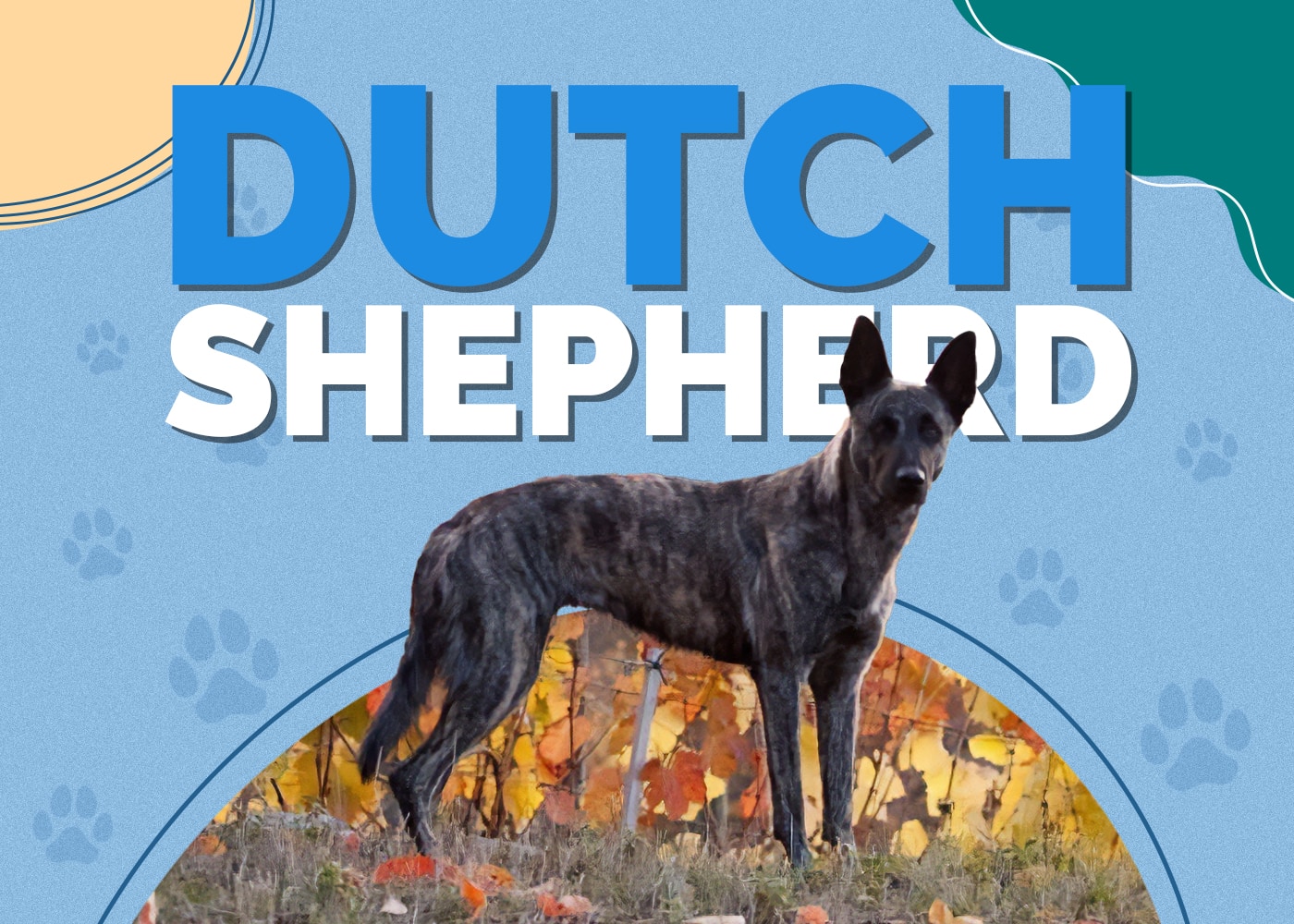German Shepherd vs. Husky: What Are the Differences?

Updated on
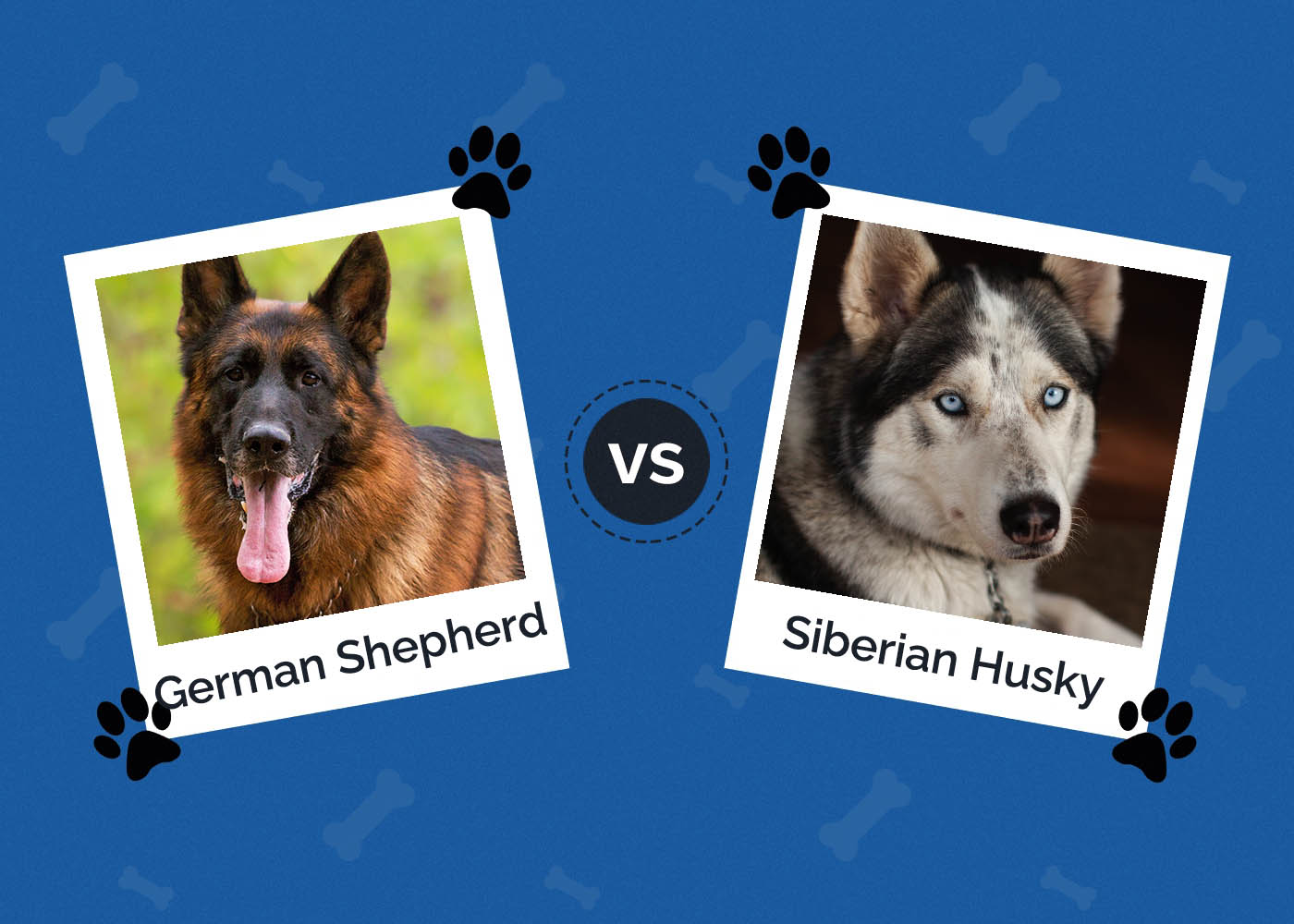
Both the German Shepherd and the Husky are well-known breeds, require a lot of energy, and are large dogs. There are plenty of similarities between the two. However, there are some major differences, too.
The German Shepherd tends to be larger and easier to train, while the Husky is more prone to barking, and they have an inherent need to climb and to survey their land from high ground. Both are working dogs but are regularly kept as pets and family companions.
Below, we have detailed everything you need to know about these breeds to help you determine which is right for your needs and which will make the best pet for your home.
Husky vs. German Shepherd: Visual Differences
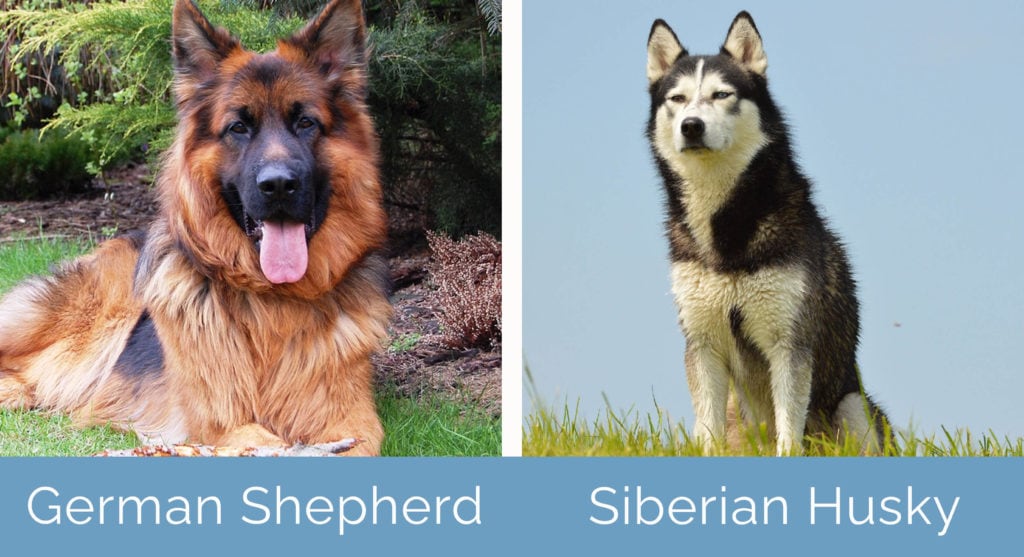
A Quick Overview
- Average Height (adult): 27-32 inches
- Average Weight (adult): 50-90 pounds
- Lifespan: 9-13 years
- Exercise: 2+ hours/day
- Grooming needs: Low/moderate
- Family-friendly: Yes
- Dog-friendly: With introduction
- Trainability: Excellent, highly intelligent
- Average Height (adult): 20-24 inches
- Average Weight (adult): 35-60 pounds
- Lifespan: 12-15 years
- Exercise: 2+ hours/day
- Grooming needs: Moderate
- Family-friendly: Usually
- Dog-friendly: Usually
- Trainability: Very good
German Shepherd Overview
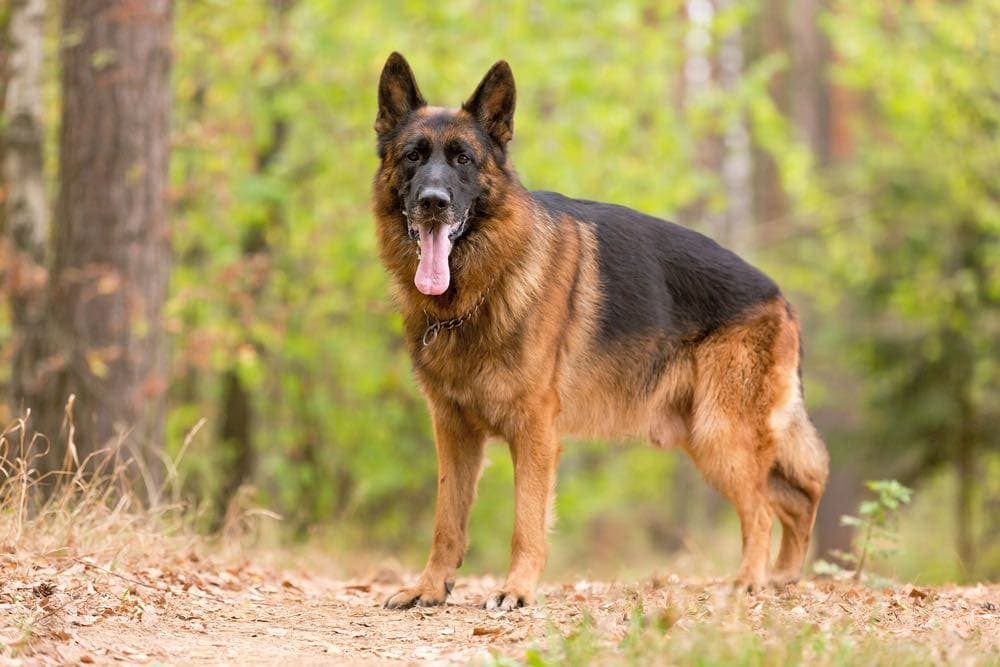
The German Shepherd is a highly capable working dog. Bred originally as a shepherd dog, they are highly versatile and perform multiple functions. They are used as police dogs, guard dogs, search and rescue dogs, and for a host of other services. They also make good family dogs, get along with other animals with a proper and patient introduction, and they are generally healthy dogs that do not have excessive grooming requirements.
Bred in Germany, the breed fell out of popularity following World War II, and breeders attempted to rebrand them as Alsatians. They have become popular pets, once again, thanks to their combination of utility, good looks, and loyalty.
Personality
The German Shepherd is sometimes interpreted as being aloof, but they’re not usually aggressive. They will take time to warm to new people, but once they do, they will be very loyal. This loyalty, coupled with the breed’s aggression, means that they can become very protective, especially if they perceive some form of threat towards their family members.
Although the breed can seem unfriendly, they not only thrive on companionship, they need it. When left alone for long periods, the German Shepherd can become depressed, destructive, and difficult. Similarly, if they do not receive enough exercise, they may look for other ways in which to expend their incredible energy levels.
Training
Renowned for their intelligence and adaptability, the German Shepherd has found utility in a wide variety of roles around the world. They are alert and can be vocal, which makes them great as guard dogs. They are also very intelligent and trainable, and they have been used as police dogs, service dogs, therapy dogs, and more.
You can train your Shep to do virtually anything. As well as learning basic commands, they can learn complex procedures, which makes them useful as herding and shepherd dogs.
Start training from a young age, be firm but fair, and utilize positive reinforcement to get the best results from your German Shepherd. Consider enrolling in agility and other canine sports classes because they will appreciate the workout, as well as the mental stimulation.
German Shepherds do bark and the “quiet” command should be one of the first that you train.
They do require early socialization. This will help ensure that they are accepting of strangers, although you should never expect a German Shepherd to be overly friendly with new people.
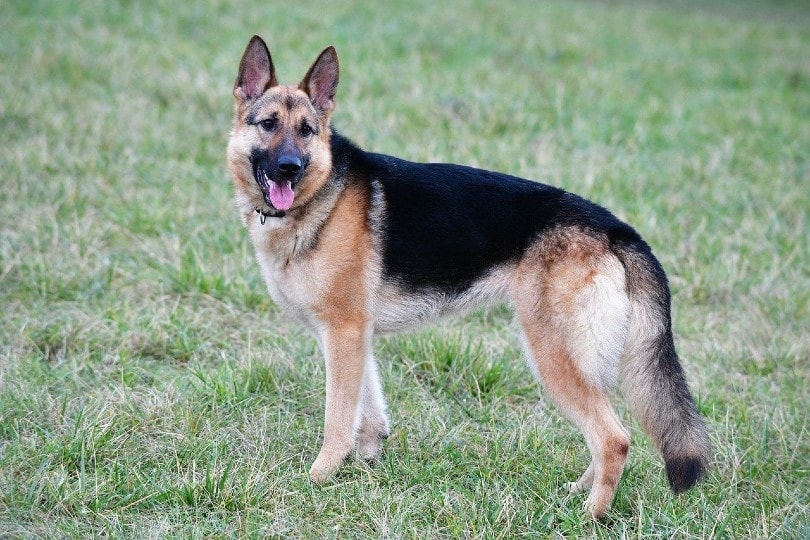
Health and Care
Although the breed is considered generally healthy, they can be prone to joint dysplasia, bloat, and allergies. They may also suffer from degenerative myelopathy and exocrine pancreatic insufficiency. Check for signs and consult with a veterinarian as soon as your dog shows any.
The breed’s coat is relatively easy to care for. Brush weekly to remove knots and to prevent a build-up of dead hair. Brush more often during shedding season. Shedding is part and parcel of owning a German Shepherd because this breed is known for year-round shedding. Don’t bathe them too often, only when absolutely necessary, as overbathing can strip the coat of natural oils that provide protection.
Suitable For:
The German Shepherd makes an excellent working dog in almost any capacity. They can also make a great family pet and companion, although they should be socialized at an early age to ensure that they’re good around children. Do be prepared to put in time and effort because this breed is easy to train and will benefit from regular training and exercise.
Owners that spend a lot of time away from the home may be better off looking for a different breed because the German Shepherd is prone to some separation anxiety once they bond with their owner.
Siberian Husky Overview
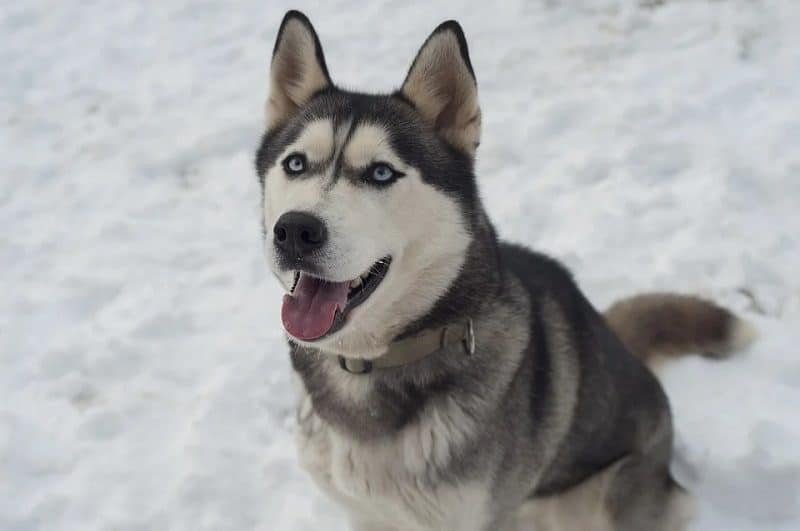
The Siberian Husky is, traditionally, a working dog. They pull sleds, live in packs, and are very powerful and independent dogs. The Husky will vocalize their emotions, no matter how they feel, and as well as thriving with time outdoors, they also like to spend time up high. So, expect to find them on top of beds, cupboards, and even trees. They are also skilled escape artists, and you will need to spend a lot of time ensuring that your yard is fully secure. Expect them to find a way through open windows and other gaps, especially if they believe it’s time to be outside.
Personality
As pack dogs, Huskies require a pack leader. If they believe you are the leader, they will follow your lead, live by your rules, and listen to your commands. But they will test your leadership capabilities.
Huskies do not do well when left alone. They will become bored and destructive, and they have very powerful teeth, which means that they will make short work of just about everything in your home and even including your home itself.
They are social animals, enjoy time with people, get along with other dogs, and can be quite comical, especially because they enjoy showing off their skills and tricks to anybody that will watch. They may look like wolves, but they tend to be very loving and friendly with anybody, including burglars, so they do not make the best watchdogs.
Training
Training is important with the Husky breed. They are pack dogs, which means that they need leadership. You will have to take charge and become the pack leader. This doesn’t mean being cruel or bullying your dog, but it does mean controlling things like access to food and toys.
The Husky is one breed that not only benefits from training but is at their happiest when being trained. They need physical and mental stimulation, which can be provided through regular training exercises, but they will really benefit from agility and other canine sports classes as well.
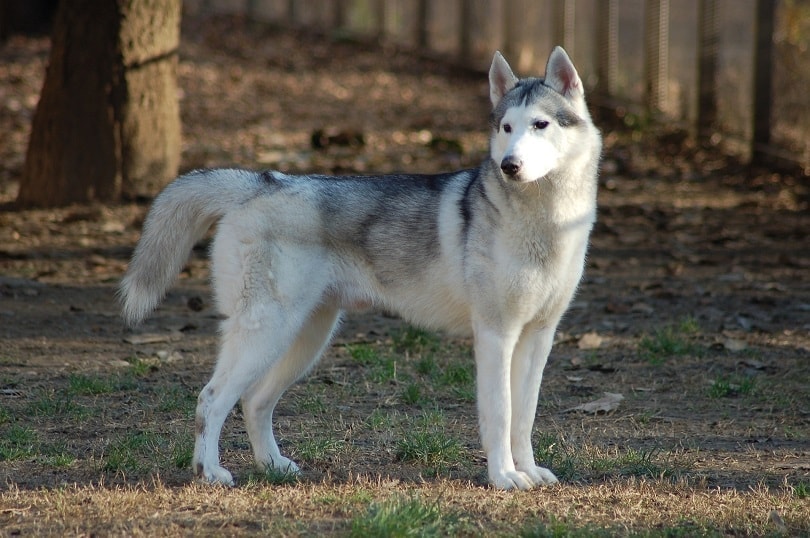
Health and Care
The Husky breed is prone to some health conditions, although they are generally considered to be healthy breeds. Cataracts, corneal dystrophy, and progressive retinal atrophy are some of the most common health problems. Consult with a veterinarian if you see any of these problems emerge in your dog.
Expect to provide an absolute minimum of an hour exercise every day. Try to give them the opportunity to run, chase balls, and engage in other high-octane exercise, but most Huskies do better when walked on a leash.
The Husky has a double coat and medium length hair. They will shed often, especially during spring, but despite this regular shedding, the breed is quite easy to care for. Brush your Husky’s coat at least once a week, ideally twice, and commit to daily brushing during shedding season. This is not only healthy for your dog, but it will protect your furniture and clothes, too.
Suitable For:
The Husky is an active, lively, smart breed. They require a lot of exercise and plenty of time outdoors, and they have an incredible knack for escaping from a seemingly secure yard or other location. They will require a lot of attention, but they will get along with most people and should have no issues living with other dogs, but they will retain some prey drive, so they may not get along with cats and smaller animals.
The Husky is another breed that is not suitable if you spend a lot of time out of the house. They will become bored and agitated, and this will manifest itself as chewing and destructive behavior, as well as baying.
Which Breed Is Right for You?
These two breeds share a lot of similarities. They are both very intelligent dogs and both require plenty of exercise. Neither breed does well when left alone for long periods and they both require training and mental stimulation. They also shed a similar amount, live for roughly the same length of time, and are both considered to be generally healthy breeds, although they do require some regular grooming.
The Husky is considered more difficult to look after. They will require more training and attention and usually do better in the hands of an experienced handler or owner. The German Shepherd may be better for first-time and novice owners, although they too require training and socialization.
Related Read:
Featured Image Credit: (L) Osetrik, Shutterstock | (R) Regular Man, Unsplash




